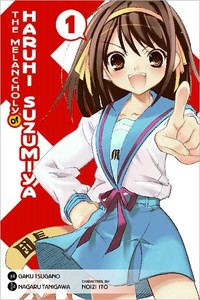Review
by Casey Brienza,The Melancholy of Haruhi Suzumiya
GN 1
| Synopsis: |  |
||
Kyon was certain that high school life was going to be boring…but he couldn't have been more wrong. No, when his bizarre classmate Haruhi Suzumiya is around, desperate to rustle up evidence of “aliens, time travelers, and espers” and recruit him as inaugural member of her newly formed Save the World by Overloading it with Fun Haruhi Suzumiya Brigade (a.k.a. SOS Brigade), things are anything but boring. Kyon soon learns, however, that Haruhi is not just a crazy girl with delusions of supernatural proportions; she actually is a girl of supernatural proportions, unconsciously able to recreate, alter, or destroy the universe at will. A number of supernatural secret agents have assembled at Kyon's high school in order to observe and, if necessary, contain her. |
|||
| Review: | |||
The Melancholy of Haruhi Suzumiya is one of those anime series with a veritable horde of fans whose devotion reminds us that the word “fan” is derived from fanatic. “Haruhi is crack,” they are wont to say, and rightly so. But if the anime adaptation of Nagaru Tanigawa's light novels is crack, then, alas, the manga adaptation is like the mother of all hangovers—sans the high. The fact that this was one of Yen Press's most anticipated licensed properties for 2008 only adds complexity to the savor of bitter disappointment. So who takes the blame for this travesty? The short answer to this question would be everyone. Share and share alike! Let's start with Tanigawa's original story premise, and let's be fair. It is pretty darn interesting, at least in theory. We have a girl with vast, unlimited power to change the world as she sees fit—without even realizing that she is doing it. So then you start to wonder if all of these strange characters assembling around her are actually, as they suggest, there to observe her. Or are they really there because she created them? The answer to the question is left intentionally ambiguous, but the utter obtuseness of the plot definitely does not help to clarify matters. Nor, for that matter, does the shoddy narrative construction. The story is told from the point of view of the ordinary boy known only as Kyon, and this monologue, which appears to have been faithfully adapted from the original novels' prose is tortured, convoluted twat. The sort of stuff, in short, that Japanese people write when they are trying—and failing—to sound genuinely literary. One is hard-pressed, for example, to imagine even the most credulous of audiences taking the sudden disappearance of the renegade Data Entity Ryouko seriously after she fails to dispatch Haruhi. Tanigawa is clearly trying to capture the perfect, nostalgic atmosphere with his prose, but all he ever actually manages to catch is his reader in the middle of a jaw-cracking yawn. The clunky, over-literal translation does not help matters, either. Those who are not familiar with the Japanese language may be wont to assume that the bizarre, near unreadability of the narrative and dialogue is supposed to be a reflection of this equally bizarre tale. But that would be a misapprehension. In fact, the prose has been so poorly adapted that certain sentence constructions, which are ordinary and natural-sounding in Japanese but clunky to the point of morbidity in English, have not been rewritten at all. (A personal pet peeve is the adjective+noun+long-dependent-clause as subject of a sentence, and it appears on numerous occasions throughout the volume. In English, this construction should be completely rewritten at the sentence level unless the purpose of the translation is purely academic. Haruhi is a lot of things…but “academic” is not one of them.) All in all, it represents an unacceptable lack of editorial effort; I would expect to read something like this translation from the likes of Netcomics, not Yen Press. And Gaku Tsugano's artwork is not anywhere near strong enough to save such an otherwise appalling production. His style bears a certain passing similarity to that of Sakurako Gokurakuin (Juvenile Orion, Category: Freaks)—minus most of the charisma. Plus, if it isn't bad enough that the characters are hardly more than your basic anime stereotypes, they are also frustratingly difficult to tell apart on the basis of art alone. In particular, it was easy to confuse Haruhi with Ryouko and Kyon with his various male friends. Arguably worst of all, the layouts, though competent enough for an action/fantasy title, lack comic pacing and timing; scenes that are supposed to be funny become easy-to-miss postage stamps in the bottom corners of pages. In conclusion, if you are new to the Haruhi franchise, do not start with the manga. Because if you do, you will be exceedingly unlikely to ever proceed past this volume. Come to think of it, do not start this manga, period—unless your medicine cabinet is already well-stocked with prescription-strength painkillers. |
| Grade: | |||
|
Overall : D+
Story : D+
Art : C+
+ The manga adaptation of an extremely popular cross-media franchise... |
|||
|
discuss this in the forum (89 posts) |
this article has been modified since it was originally posted; see change history |
|||
| Production Info: | ||
|
Full encyclopedia details about Release information about |
||